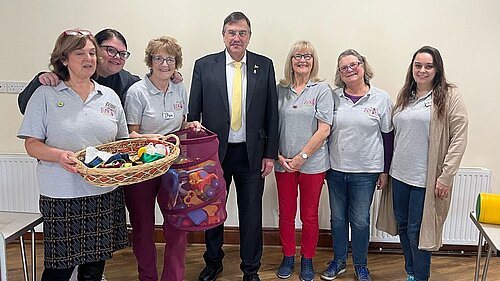2025: Week 5 - Local Elections and Crisis in Childcare

Last week the local elections for Devon in May were confirmed to happen as scheduled by the Government. The request by the Devon County Council Conservative administration to delay the election for a year was denied.
I’m delighted that the Government has now included the eight District councils in Devon in the discussion over how we create new unitary councils across Devon. This happened after I pushed the Government in Parliament. Until then, Government had just asked the County Council.
Now our councils have until March 21st to come up with a plan that they can all agree too. It they cannot, Whitehall will impose a plan on us…
In my Select Committee we spoke with AI technologists and content creators about the Government consultation on AI and copyright. The Committee felt that Copyright should be respected, and that any relaxation to allow AI developers to ignore it shouldn’t be approved.
Back in the constituency, this week I met with a local mother and baby group. Devon County Council is responsible for making sure that childcare provision is adequate. The report details show that across the constituency, it isn’t adequate and hasn’t been for years. I spoke about this in previous years, and again at the DCC cabinet meeting in January this year.
Since that report was written, it has become even worse with the closure of one of the last year-round nurseries in Dawlish. Across Dawlish, Teignmouth, Kingsteignton and Newton Abbot there just aren’t enough places to meet the need.
I spoke with a potential provider hoping to take over the closed nursery in Dawlish, and they explained some of the difficulties.
The government promises 30 hours free childcare – which sounds great, but it doesn’t work. Not only does it not reflect the hourly rate needed to pay staff, but it also only covers term time, not the school holidays.
When applied all year round, it means that the government funding covers around 22 hours per week. Not enough for a new mother to go back to work other than a part time role. Also, most nurseries need to top up the funds by having to offer a separate charge for ‘consumables’, food and essential items such as nappies.
I found out this week that if in receipt of Universal Credit with a child between 3 and 12 years old, mothers are expected to be available to work up to 30 hours a week, presumably because the Government thinks that the ‘free’ childcare covers this – but it clearly doesn’t.
Is it any wonder that women find it hard to get back to work? Relying on ageing grandparents or friends and family is not always possible, and often not sufficiently reliable.
If the Government is serious about a growth agenda, one key item is getting more people back into work. Sufficient and affordable childcare would enable a significant proportion of the younger workforce to get back into work sooner.